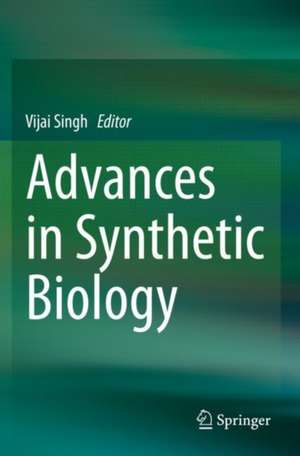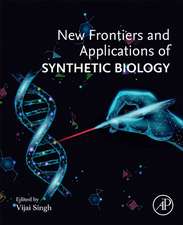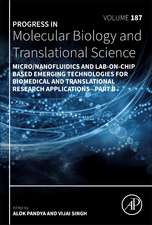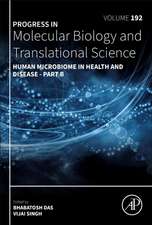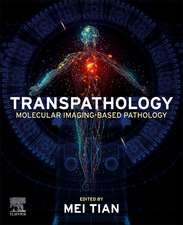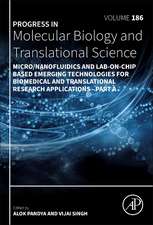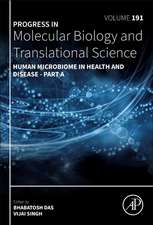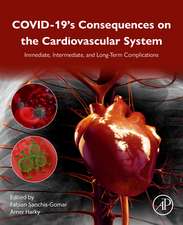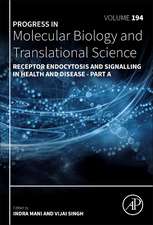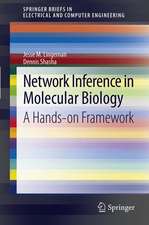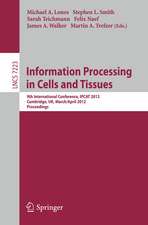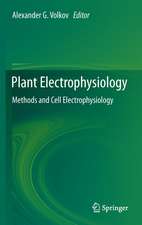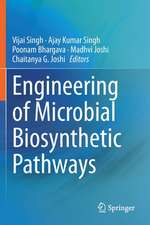Advances in Synthetic Biology
Editat de Vijai Singhen Limba Engleză Paperback – 26 aug 2021
The book subsequently summarizes recent developments in technologies for assembling synthetic genomes, minimal genomes, synthetic biology toolboxes, CRISPR-Cas systems, cell-free protein synthesis systems and microfluidics. Accordingly, it offers a valuable resource not only for beginners in synthetic biology, but also for researchers, students, scientists, clinicians, stakeholders and policymakers interested in the potential held by synthetic biology.
| Toate formatele și edițiile | Preț | Express |
|---|---|---|
| Paperback (1) | 796.04 lei 38-44 zile | |
| Springer Nature Singapore – 26 aug 2021 | 796.04 lei 38-44 zile | |
| Hardback (1) | 952.09 lei 3-5 săpt. | |
| Springer Nature Singapore – 14 apr 2020 | 952.09 lei 3-5 săpt. |
Preț: 796.04 lei
Preț vechi: 1047.42 lei
-24% Nou
Puncte Express: 1194
Preț estimativ în valută:
152.34€ • 158.46$ • 125.77£
152.34€ • 158.46$ • 125.77£
Carte tipărită la comandă
Livrare economică 11-17 aprilie
Preluare comenzi: 021 569.72.76
Specificații
ISBN-13: 9789811500831
ISBN-10: 9811500835
Pagini: 349
Ilustrații: XIII, 349 p. 1 illus.
Dimensiuni: 155 x 235 mm
Greutate: 0.61 kg
Ediția:1st ed. 2020
Editura: Springer Nature Singapore
Colecția Springer
Locul publicării:Singapore, Singapore
ISBN-10: 9811500835
Pagini: 349
Ilustrații: XIII, 349 p. 1 illus.
Dimensiuni: 155 x 235 mm
Greutate: 0.61 kg
Ediția:1st ed. 2020
Editura: Springer Nature Singapore
Colecția Springer
Locul publicării:Singapore, Singapore
Cuprins
Chapter 1. Introduction to Synthetic Biology.- Chapter 2. Current progress in synthetic genetic networks.- Chapter 3. Current Progress and Limitations in the Design, Construction and Characterization of Synthetic Parts.- Chapter 4. Recent progress in DNA parts standardization and characterization.- Chapter 5. Current status and challenges of DNA sequencing.- Chapter 6. Biomimetic approaches in synthetic biology.- Chapter 7. Design principles of synthetic biological oscillators.- Chapter 8. SOFTWARE-AIDED DESIGN OF IDEALISED PROGRAMMABLE NUCLEIC ACID CIRCUITS.- Chapter 9. Digital Circuit Design for Biological and Silicon Computers.- Chapter 10. Engineering of riboregulators for gene regulation as a tool for synthetic biology.- Chapter 11. Recent advances, challenges and opportunities in riboswitches.- Chapter 12. Recent Advances in Gene and Genome Assembly: Challenges and Implications.- Chapter 13. Recent advances, challenges and opportunities in synthetic genomes.- Chapter 14. Expansion of the genetic code.- Chapter 15. Expanding the potential of CRISPR-Cas9 technology for crops improvement.- Chapter 16. Synthetic biology at the hand of cell-free systems.- Chapter 17. Synthetic Biology for the Rapid, Precise and Compliant Detection of Microbes.- Chapter 18. Application and challenges of synthetic biology.- Chapter 19. Development and Application of Microfluidics in Synthetic Biology.- Chapter 20. The Ethics of Synthetic Biology Research and Development: A Principlist Approach.
Notă biografică
Dr. Vijai Singh is an Associate Professor at the Department of Biosciences, Indrashil University, Mehsana, Gujarat, India. He previously served as a Postdoctoral Fellow at the Institute of Systems and Synthetic Biology, France and at the School of Energy and Chemical Engineering, Ulsan National Institute of Science and Technology, South Korea. Dr. Singh has also served as an Assistant Professor at Department of Biotechnology, Invertis University, India and the Department of Biological Sciences and Biotechnology, Institute of Advanced Research, India. He received his Ph.D. in Biotechnology from Dr. A.P.J. Abdul Kalam Technical University/National Bureau of Fish Genetic Resources, Lucknow, India.
Dr. Singh has designed and characterized a number of synthetic oscillators, gene regulatory networks, and biosynthetic pathways in Escherichia coli. Currently, his laboratory is focusing on the construction of a novel biosynthetic pathway for the production of pigments and chemicals. Additionally, his laboratory works on development of CRISPR-based platform for the diagnosis and eradication of multidrug resistant pathogens. Dr. Singh has published 72 articles, 23 book chapters, and two books. He currently serves as a member of the editorial board and reviewer for a number of peer-reviewed journals.
Dr. Singh has designed and characterized a number of synthetic oscillators, gene regulatory networks, and biosynthetic pathways in Escherichia coli. Currently, his laboratory is focusing on the construction of a novel biosynthetic pathway for the production of pigments and chemicals. Additionally, his laboratory works on development of CRISPR-based platform for the diagnosis and eradication of multidrug resistant pathogens. Dr. Singh has published 72 articles, 23 book chapters, and two books. He currently serves as a member of the editorial board and reviewer for a number of peer-reviewed journals.
Textul de pe ultima copertă
This book addresses the design of emerging conceptual tools, technologies and systems including novel synthetic parts, devices, circuits, oscillators, biological gates, and small regulatory RNAs (riboregulators and riboswitches), which serve as versatile control elements for regulating gene expression. Synthetic biology, a rapidly growing field that involves the application of engineering principles in biology, is now being used to develop novel systems for a wide range of applications including diagnostics, cell reprogramming, therapeutics, enzymes, vaccines, biomaterials, biofuels, fine chemicals and many more.
The book subsequently summarizes recent developments in technologies for assembling synthetic genomes, minimal genomes, synthetic biology toolboxes, CRISPR-Cas systems, cell-free protein synthesis systems and microfluidics. Accordingly, it offers a valuable resource not only for beginners in synthetic biology, but also for researchers, students, scientists,clinicians, stakeholders and policymakers interested in the potential held by synthetic biology.
Caracteristici
Compiles the recent advancements in Synthetic Biology and its biotechnological, industrial and biomedical applications Reviews the state-of-the-art tools and technologies for DNA synthesis, DNA sequencing, genome designing, and assembly Describes the cell-free protein synthesis systems, non-coding DNA, automaton computing, expansion of genetic code, and microfluidics for lab-on-chip and cell dynamics analysis Outlines the function of small non-coding RNA for gene regulation, biosensor, and therapeutic applications
